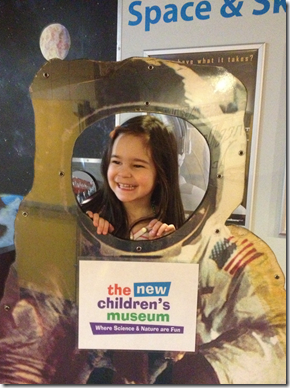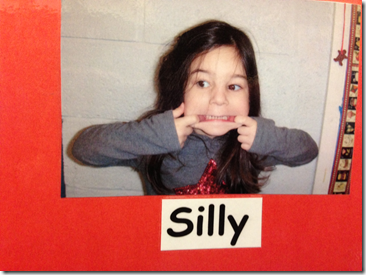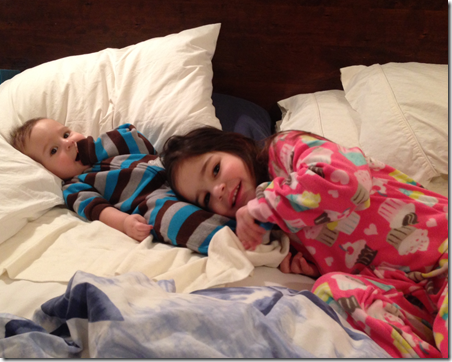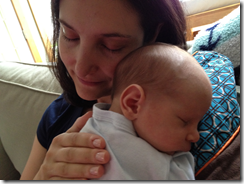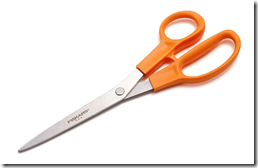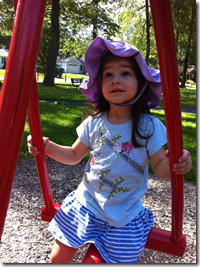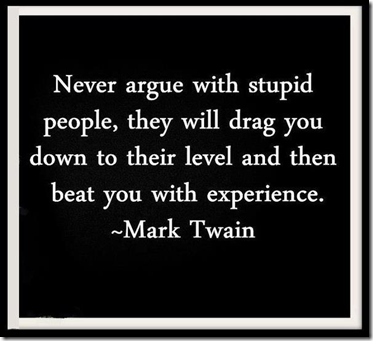Kid words for future characters
/I keep a list of all the invented and divergent words and phrases that my daughter uses in hopes of sprinkling these gems into future dialogue.
Two that I recently added to the list are pancholeen and last day.
Panchleen is the word that Clara uses for trampoline.
Last day is the phrase she uses for any day prior to today. Without a good understanding of time, any day before today is last day.
I love this phrase. I’ll be so sad when she stops using it.
The definition of silly.
/I found this hanging on the wall of my daughter’s preschool. Each child in her class was chosen to represent a specific emotion, and she was picked for silly.
I’ve never actually seen her make this face before, which made the photo all the more surprising.
What are my chances of getting this image into the dictionary under the word silly? I’ve tried to figure out how dictionaries choose images to match their definitions, but I can’t find a single word on the subject.
Yes, this is how I spend my time. Researching nonsense like this. Except wouldn’t it be great if I actually managed to get this photo into a real dictionary?
Sometimes there’s gold at the end of a rabbit hole.
Perhaps not this one.
Still, if this photo works in pre-school, why can’t it work for Merriam-Webster?
Dicks serves a purpose
/My last name has not always been the easiest thing to live with. It’s resulted in teasing, the occasional crass joke and even a smattering of confusion when people over the phone ask me to repeat my last name two or three times, seeming unable to believe it each time.
It’s even necessitated the use of a pseudonym in the UK.
But my last name has proven to be beneficial at times as well.
It’s toughened me up considerably and probably contributed to my ability to disregard what other people think of me.
I suspect that it’s also contributed to my sense of humor.
My last name was also an integral part of my first Moth StorySLAM story, which I won.
Now it appears that there is a scientific advantage to my last name.
It turns out that the first letter of a childhood surname determines much about our consumer behavior as adult, according to a new study in the Journal of Consumer Research.
The authors studied how quickly adults responded to opportunities to acquire items of value to them. They found that the later in the alphabet people’s childhood surnames were, the faster those consumers responded to purchase opportunities.
Children with last names that fall late in the alphabet are often at the end of lines or at the back of the class. “The idea holds that children develop time-dependent responses based on the treatment they receive,” the authors explain. “In an effort to account for these inequities, children late in the alphabet will move quickly when last name isn’t a factor; they will ‘buy early.’ Likewise, those with last names early in the alphabet will be so accustomed to being first that that individual opportunities to make a purchase won’t matter very much; they will ‘buy late.’”
I went to school with a girl named Melissa Zarnick. If the research is correct, it’s likely that Melissa is one of the worst impulse shoppers on the planet and in serious credit card debt.
Dicks isn’t as good as Allaire or Archambault (other last names in my high school class), but it isn’t bad in terms of its placement in the alphabet.
To prove my point, I’m currently driving a ten year-old car and watching an eleven year-old television connected to a fifteen year-old combination VHS/DVD player. The television is not HD and cannot stream content and the remote control on the DVD player no longer works.
I am the epitome of “buy late.”
A demanding public
/A kind but somewhat questionable reader wrote to me today and said:
Please please please tell me you have written some more books - or at least one!!!!!
I’m strongly opposed to the use of the multiple exclamation point, but in this instance, I’ll overlook it. The sentiment is kind and rather humbling.
She also said:
Please chuck in the kids and get cracking on your computer. We need you more than they do!!!
Once again, I’m willing to accept the multiple exclamation points, but the suggestion that I “chuck in the kids” is a little tougher to ignore.
My wife’s only parenting blunder involves the potentially hazardous use of scissors.
/My wife is quite nearly a perfect mother.
She worries a little more than is necessary, but this appears to be a prerequisite to mothering, and her car is littered with the detritus of tiny people, but I suspect that this will not unduly influence my children in any long-term way.
Otherwise, I have almost never objected to a single parenting decision that she has made. I find that remarkable.
In fact, the only objectionable parenting decision that she had made (and continues to make) is her inexplicable and slightly insane insistence on referring to scissors as “a scissor.”
Scissor is a verb. It means to “cut with scissors” or to “move one's legs back and forth in a way resembling the action of scissors.”
The noun that this verb references is scissors.
There is an ‘S” at the end of the word.
Elysha’s made this error for as long as I’ve known her, and she is hardly to blame. I’ve heard her mother refer to scissors in the same way many times. While I’ve always found it a little strange, I’ve been able to ignore this crack in her otherwise pristine armor.
But now that impressionable minds are at risk, I’m concerned that my children will go forth into the world asking their kindergarten teachers if they can borrow “a scissor” rather than a pair of scissors.
It worries me.
In order to counteract this problem, I attempt to use the word correctly in the presence of my children as often as possible, and I always provide the correct use of the word whenever Elysha uses it incorrectly.
“Could you hand me that scissor, Matt”
“Sure, I’ll grab those scissors for you, honey. Here you go. A pair of scissors just for you. Enjoy those scissors.”
In the grand scheme of things, it’s a fairly small thing compared to the parenting mistakes that I watch people make on an almost daily basis, but as a person who makes his living with words, it’s still a concern.
The future happiness of my children is at stake.
Thanks. Ouch.
/My friend (who is under 30 and lives in Brooklyn) referred to me as a “42-year old hipster” in his happy birthday greeting to me yesterday.
I don’t think I’ve ever felt so complimented and insulted by the same statement.
So I guess there’s no practical use for the word then…
/Thanks to Twitter, I have been informed that to “decimate” does not mean to obliterate or wipe out. It means to destroy one-tenth of something.
Great. There have been untold number of times in my life when I have needed to describe the destruction of just ten percent of something.
Problem solved.
I’m not anti-feminist. I just don’t like stupid.
/For the record, my persistent use the word "mankind" has nothing to do with my support of the patriarchy.
I just think the word "humankind" sounds really, really stupid.
Dicks could have spared humiliation had they been born in Denmark
/In Denmark, choosing both the first and last name for a child is serious business, requiring the approval of the Ministry of Ecclesiastical Affairs and the Ministry of Family and Consumer Affairs. The Law on Personal Name is designed to protect the a child from a name that is embarrassing or could cause him or her to suffer ridicule or abuse.
Expectant parents can choose a pre-approved name from a government list of 7,000 mostly West European and English names. Those wishing to deviate from the list must seek permission.
About 1,100 new names are reviewed every year, and 15-20% are rejected, mostly for odd spelling.
While this law initially seemed heavy handed to me, my father’s name is Leslie Dicks, and he goes by Les Dicks. Also, I have a great uncle named Harry Dicks and an uncle named Harold Dicks who also goes by Harry Dicks.
I have to believe that these men would have been protected from the horrors of their names had the United States adopted legislation similar to Denmark .
In fact, our surname might have been eliminated long ago had the Denmark law been in place within the United States.
Then again, you would be hard pressed to find three tougher people on this planet than my father and my uncles.
As I have explained to my wife many times, as difficult as my last name was at times, it also taught me some important life lessons.
Like how sticks and stones may break my bones but names will never hurt me.
Also, the most effective place to punch someone in the face if that becomes necessary.
I adore authenticity, even when it hurts
/Someone offered me a compliment this week (one of the nicest things anyone has ever said to me, but not nice enough to crack my top three list), but she prefaced the compliment by saying, “I really hate to offer you a compliment of any kind, but…”
I think I appreciated the preface almost as much as the compliment itself.
Consistency, people.
/It’s a pet-peeve perhaps, but the seemingly random capitalization of words makes me crazy.
Think about it: In order to produce this sign, someone had to purposefully hold the shift key down while typing three of the words in the sentence but (for reasons I will never understand) release the shift key for the fourth.
It makes absolutely no sense. It’s crazy-town. Truly.
I say this is a clever verbal strategy for identifying stupidity. My wife says I’m mean and wrong. Settle the debate.
/My wife says this is mean.
I think it was brilliant.
I was speaking to a person whose intelligence, at least in regards to the nature of our discussion, was questionable at best. On a whim, I decided to test his knowledge of the subject matter and his overall intelligence by inserting an invented word into a sentence at a critical juncture to see how he would react.
I said, “The problem with that education policy is that it’s fiscally unsound and pelepanatic.
Pelepanatic was the invented word, and please note that it’s meaning is critical in understanding the nature of my argument. It was not an arbitrary word that had not meaning in terms of the sentence.
The person to whom I was speaking pressed on without asking about the invented word, confirming to me that he was an idiot.
Thus I thought I had stumbled upon a remarkable effective strategy for weeding out the morons of the world, but my wife says not so fast.
While ignoring the invented word may suggest certain characteristics of the person, intelligence or general knowledge is not one of them.
Perhaps the person was too embarrassed by his ignorance of the word to ask for a definition.
Maybe the person used context clues to make an assumption about the definition of the word.
It’s possible that the person took a mental note to find the meaning of the word at another time.
Maybe the person opted not to display weakness in the midst of a debate even if that meant letting the word go undefined.
My wife claims that this newfound strategy is mean and does not serve the purpose intended.
I’m not so sure. I kind of like it. I think it has potential.
Thoughts?
Your North Face is a your coat, moron.
/Could someone please explain to me how the brand name North Face has come to replace the word coat for some people?
I hear adults and my students say things like, “Let me just grab my North Face” or “I forgot my North Face on the playground.”
Do these people also refer to their refrigerators as their Whirlpool and their underwear as their Fruit of the Loom?
“You’re North Face?” I always ask. “Do you mean your coat?”
I hardly think that North Face has achieved the level of market dominance necessary to allow it to replace the word coat like the brand name Xerox once stood in place of the word photocopy.
I suspect brand snobbery at work here, and I don’t like it.
Bad Internet
/The Internet is one of humankind’s greatest achievements. It’s almost impossible to imagine a world without it.
Still, I can’t help but think that before the Internet, this sentence, and sentences like it, never existed:
Need. Coffee. Now.
There’s something to be said for the old days.
You look terrible, and I think it’s great.
/As I entered the gym, a woman who I know only slightly approached to say hello. After a moment of small talk, she said, “I just love how you don’t care what you look like when you come to the gym.”
I think she was trying to be complimentary, but I’m not so sure.
Dude
/No more “penis”
/Yesterday afternoon, I participated in a panel discussion on the Huffington Post’s online television network, HuffPost Live, about the appropriateness of teaching young children to refer to parts of the body like the penis and the vagina with anatomically correct terminology.
The conversation was initiated as a result of a blogger who wrote about her avoidance of the word “penis” with her three year old son.
Here is the video of our discussion:
